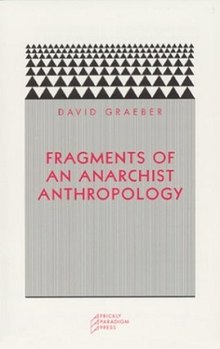Fragments of an Anarchist Anthropology
[1][2][3][4] With the essay, anthropologist David Graeber attempts to outline areas of research that intellectuals might explore in creating a cohesive body of anarchist social theory.
The Tsimihety, rejecting all governmental authority and organizing their society along very egalitarian lines, were able to continue their autonomy and culture for decades on end, up to the present, not by confronting the government, but by retreating.
Graeber writes, To this day they have maintained a reputation as masters of evasion: under the French, administrators would complain that they could send delegations to arrange for labor to build a road near a Tsimihety village, negotiate the terms with apparently cooperative elders, and return with the equipment a week later only to discover the village entirely abandoned—every single inhabitant had moved in with some relative in another part of the country.
(p. 55)In particular, Graeber suggests several areas a hypothetical anarchist anthropology would need to tackle, and in the book elaborates on each point briefly: Graeber offers several possibilities why anthropologists are reluctant to come out and make normative judgments and proposals: "In many ways, anthropology seems a discipline terrified of its own potential.
Part of the problem, Graeber claims, is that academics on the radical left have gravitated toward the more "High Theory"-oriented Marxism rather than the more practice-oriented anarchism.
